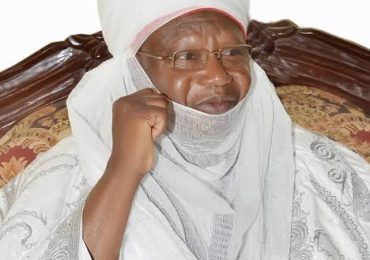By Chidiebere Ugwu
Emir of Nasarawa, His Royal Highness, Alhaji Ibrahim Usman Jibril, has called for collective efforts of all stakeholders to mitigate the impact of rising climate change.
The Emir, who made the call at a one-day seminar organized by Development Agenda Magazine in collaboration with Environment Media Correspondent Association of Nigeria, EMCAN, in Abuja, said all hands must be on deck to tackle the scourge of climate change.
Alhaji Jibril, who was a former Minister of Environment, noted that environmental issues had become global challenges and emphasized that Nigeria was not left out in view of the challenges facing the country.
According to him, “We have issues of land encroachment, oil pollution, deforestation
among others.
“The issues of desert encroachment, oil pollution and flooding are challenges we are see all around us in the country over.”
The Emir stressed further that these were long term temperature, shifts in temperature and weather conditions that have become Climate Change issues.

In his address, the Chairman of the occasion and the Conservator General, CG, of the National Park Service, NPS, Dr Ibrahim Goni, enjoined all relevant stakeholders to join efforts to tackle Climate Change by planting trees.
Goni, while also canvassed support for Environment Media Correspondents in Nigeria, EMCAN, in what they are doing to create awareness, noted that it was a awake up call for everyone in the country to know that Climate Change was a reality due to the current atmospheric changes.
He noted that because of the Presidential Declaration Order, of 2022, the 9th National Assembly had already approved some 10 new National Parks.
The seven National Parks provide a total area of vegetation of 20,000 square kilometres, and we are confident that it would sequester carbon by 4.8 million parts.
He said, “This means that with the introduction of the new 10 national parks, carbon dioxide is going to be sequestrated.’’
Goni applauded Government’s efforts in carbon mediation and the planting of 25 million trees to cushion the effects of Climate Change in the country.
In his remarks, the Programme Coordinator of United Nations Industrial Development Organization, UNIDO, Oluyomi Banjo emphasized the role of the media in passing the messages of climate change .
Banjo therefore thanked EMCAN, describing the body as an organization for the job well done.
Banjo said that for Nigeria to tackle Climate Change, there was a need for leaders to key in and identify the roles to be played to tackle it.
According to him, “UNIDO has be working tirelessly with the Nigeria government and they can’t achieve this without the support of media practitioners”.
Speaking earlier, the Publisher and Editor-in-Chief of Development Agenda Magazine, Mr. Paddy Ezeala, said the occasion was important in profiling the issues of Climate Change in Nigeria.
Ezeala said: “This is special as it relates to the upcoming 28th Conference of the Parties (COP28) coming up in Dubai, UAE, later this month.
“By extension, it is also an opportunity for us to take stock of the state of our environment and evaluate our responses to the various challenges confronting us in that regards.
“The consequences of climate change are manifesting starkly in Nigeria and, in fact, across West Africa.
“We can no longer pretend that nothing is happening. We are all affected.”
EMCAN Chairman, Amechi Chuks Oyema said the significance of the seminar was to ascertain the level of preparedness of Nigeria for COP28.
Oyema said that EMCAN as media practitioners were out to showcase what other stakeholders had done to tackle Climate Change.
The EMCAN Chairman therefore, urged members of the Association to put in more effort in reporting the environmental challenges, especially Climate Change.
Oyema said that participation in the COP28 would enable EMCAN members build more capacity on the job.
Slated to hold in the United Arabs Emirate, COP28 UAE would bring the world together at a critical moment for global transformative climate action.
It would be recalled that the three decades since the Rio Summit and the launch of the United Nations Framework Convention on Climate Change, UNFCCC, the Conference of the Parties to the Convention (COP) has convened member countries every year to determine ambition and responsibilities, and identify and assess climate measures.
The 21st session of the COP (COP21) led to the Paris Agreement, which mobilized global collective action to limit the global temperature increase to 1.5C above pre-industrial levels by 2100, and to act to adapt to the already existing effects of Climate change.











